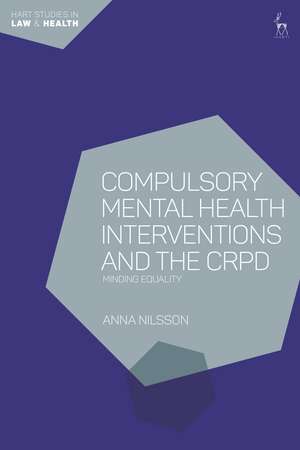Compulsory Mental Health Interventions and the CRPD: Minding Equality: Hart Studies in Law and Health
Autor Anna Nilssonen Limba Engleză Paperback – 19 oct 2022
| Toate formatele și edițiile | Preț | Express |
|---|---|---|
| Paperback (1) | 255.94 lei 6-8 săpt. | |
| Bloomsbury Publishing – 19 oct 2022 | 255.94 lei 6-8 săpt. | |
| Hardback (1) | 538.84 lei 6-8 săpt. | |
| Bloomsbury Publishing – 24 feb 2021 | 538.84 lei 6-8 săpt. |
Preț: 255.94 lei
Preț vechi: 330.37 lei
-23% Nou
Puncte Express: 384
Preț estimativ în valută:
48.98€ • 50.95$ • 40.44£
48.98€ • 50.95$ • 40.44£
Carte tipărită la comandă
Livrare economică 14-28 aprilie
Preluare comenzi: 021 569.72.76
Specificații
ISBN-13: 9781509944576
ISBN-10: 1509944575
Pagini: 200
Dimensiuni: 156 x 234 mm
Greutate: 0.29 kg
Editura: Bloomsbury Publishing
Colecția Hart Publishing
Seria Hart Studies in Law and Health
Locul publicării:London, United Kingdom
ISBN-10: 1509944575
Pagini: 200
Dimensiuni: 156 x 234 mm
Greutate: 0.29 kg
Editura: Bloomsbury Publishing
Colecția Hart Publishing
Seria Hart Studies in Law and Health
Locul publicării:London, United Kingdom
Caracteristici
Provides an innovative interpretative framework which will appeal to scholars and practitioners
Notă biografică
Anna Nilsson is Postdoctoral Fellow at the Faculty of Law, Lund University.
Cuprins
Introduction I. To Intervene or not to Intervene? II. Methodological Remarks III. Vocabulary and Key Concepts IV. A Roadmap for this Book 1. The Convention's Approach to Mental Health Care I. A New Approach to Mental Health Care II. Article 12 and the Right to Enjoy Legal Capacity III. Article 14 and the Right to Liberty IV. Article 17 and the Right to Respect for Physical and Mental Integrity V. Article 25 and the Right to Consent VI. The Enjoyment of Legal Capacity, Liberty and Integrity 'on an Equal Basis with Others' A. The Prohibition of Discrimination B. The Objective and Reasonable Standard VII. The CRPD's Approach to Mental Health Care in Brief 2. Putting Mental Health Laws to the Test I. Applying the Objective and Reasonable Standard II. Domestic Mental Health Legislation III. Do Compulsory Interventions Serve Legitimate Aims? IV. Are Compulsory Interventions Based on Objective Criteria? A. The Protection of the Health of the Person Concerned B. The Protection of the Life of the Person Concerned C. The Protection of Others V. Are Compulsory Interventions Reasonable? VI. Conclusions on the Objectivity and Reasonableness of Domestic Regimes 3. Proportionality Reasoning I. A Way Forward? II. Theoretical Underpinnings III. The Rudiments of Proportionality Assessment A. Legitimate Aim(s) B. Suitability C. Necessity D. Proportionality in the Narrow Sense IV. Compatibility with the Objective and Reasonable Standard V. Assessing and Weighing Arguments A. Abstract Weights B. Degrees of Infringement VI. Dealing with Epistemic Uncertainty A. Empirical Uncertainty and Discretion B. Normative Uncertainty and Discretion VII. The Advantages and Disadvantages of Proportionality Reasoning A. The Legal Soundness of Classification Choices B. Too Much Discretion? C. Structure and Precision 4. Proportionality and Non-discrimination I. The Focus on Distributive Justice II. Proportionality Assessments Tailored to Non-discrimination Norms A. Legitimate Aim: Excluding Offensive Policies B. Suitability: Excluding Ineffective Policies C. Necessity: Excluding Excessive Policies D. Proportionality: Excluding Inconsistent Policies and Policies with Unreasonable Disadvantageous Effects III. Applying the Consistency Requirement A. Compulsory Intervention to Protect Health B. Civil Detention to Protect Life C. Civil Detention to Protect Others D. The Value of a Consistency Requirement IV. The Role of Equality-specific Harm in BalancingA. The Compulsory Mental Health Care of Persons with Psychosocial Disabilities B. The Compulsory Care of Everyone Who Lacks Decision-making Ability V. The Value of Structured Proportionality Assessments in the Non-discrimination Context VI. A Framework for Evaluating Domestic Systems of Compulsory Mental Health Care Conclusion I. To Intervene or Not to Intervene? A Difficult Question II. The Long Answer to the Question A. The Limits Set by the Treaty Text B. The Limits Set by Discrimination Analysis C. CRPD-compliant Compulsory Mental Health Interventions to Protect the Health and Lives of Patients III. Concluding Remarks on the Future of Mental Health Law and Policy
Recenzii
A very useful tool for those who might be seeking to design principled and evidence-based mental health care regimes, because it provides a helpful set of measures against which to stress test both legislation and policies.





